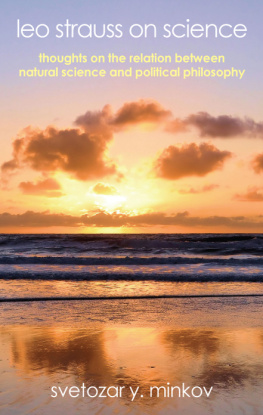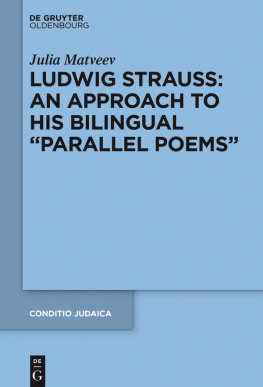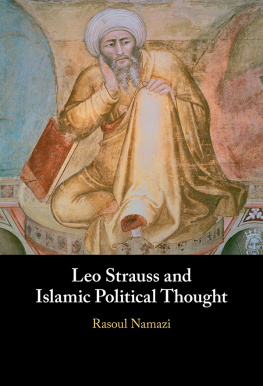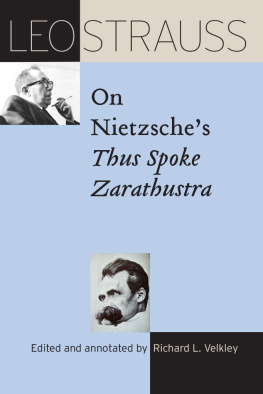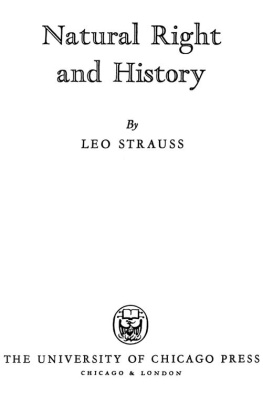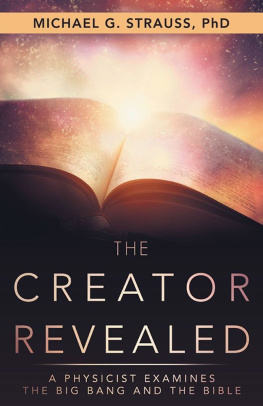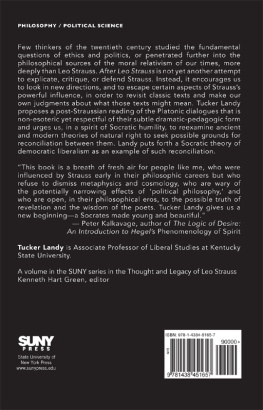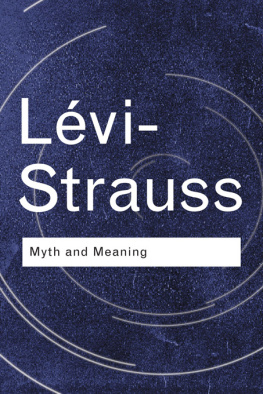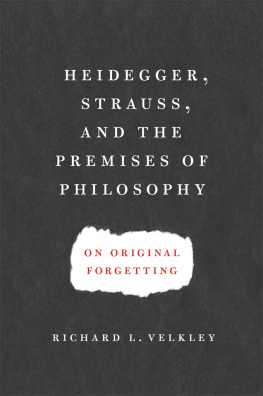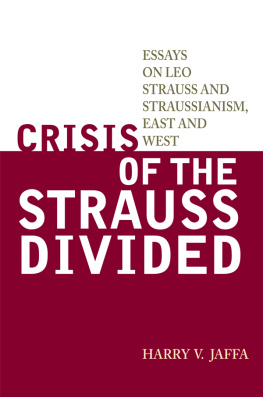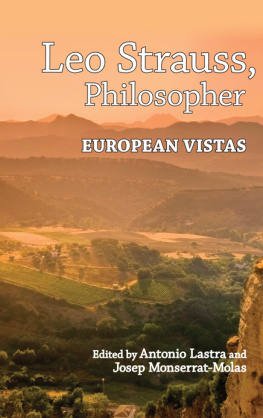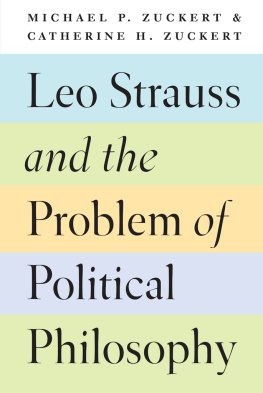Leo Strauss on Science
SUNY series in the Thought and Legacy of Leo Strauss
Kenneth Hart Green, editor
Leo Strauss on Science
Thoughts on the Relation between
Natural Science and Political Philosophy
SVETOZAR Y. MINKOV
Published by State University of New York Press, Albany
2016 State University of New York
All rights reserved
Printed in the United States of America
No part of this book may be used or reproduced in any manner whatsoever without written permission. No part of this book may be stored in a retrieval system or transmitted in any form or by any means including electronic, electrostatic, magnetic tape, mechanical, photocopying, recording, or otherwise without the prior permission in writing of the publisher.
For information, contact State University of New York Press, Albany, NY
www.sunypress.edu
Production, Eileen Nizer
Marketing, Kate R. Seburyamo
Library of Congress Cataloging-in-Publication Data
Names: Minkov, Svetozar Y., 1975 author.
Title: Leo Strauss on science : thoughts on the relation between natural science and political philosophy / Svetozar Y. Minkov.
Description: Albany : State University of New York Press, 2016. | Series:SUNY series in the thought and legacy of Leo Strauss | Includes bibliographical references and index.
Identifiers: LCCN 2016009116 (print) | LCCN 2016031747 (ebook) | ISBN 9781438463117 (hardcover : alk. paper) | ISBN 9781438463131 (e-book)
Subjects: LCSH: Strauss, Leo. | Natural history. | Political sciencePhilosophy.
Classification: LCC B945.S84 M48 2016 (print) | LCC B945.S84 (ebook) | DDC 181/.06dc23
LC record available at https://lccn.loc.gov/2016009116
10 9 8 7 6 5 4 3 2 1
Philosophy as improvement of the soul is not a partial pursuitas it would seem to be if it had been understood only as medicine of the mindbecause the soul, the human soul, while being a part of the whole is yet in a way the whole.
Session 15 of Strausss course on Platos Gorgias, March 10, 1957
Contents
Preface
Strausss Apparent Silence on Science
Even though modern science has enormous practical and intellectual power, not every great modern thinker discusses it or its presuppositions. But as I argue in this study, Leo Strauss, contrary to first appearances, did. While it is understandable that Strauss is not known as a thinker who focused on modern natural science, a survey of his published and unpublished works shows a persistent concern with the philosophical preconditions of science, even in the narrow sense of the term. To uncover and interpret the views on science by one of the great thinkers of the last centuryto let that thinker speak about the character of modern science, about the presuppositions of science as such, about the relation between human life, human nature, and the universeis the aim of this book. I hope that work on Strausss understanding of science, of which my book can only be a small fragment, may stimulate to a rethinking of natural science, political philosophy, and their relationa rethinking similar in richness, if not in substance, to that initiated by Nietzsches, Husserls, and Heideggers reflections on science.
Strauss studied modern natural science seriously in some respects and less seriously in others. He studied it not in its specialized details, as would a modern physicist, but in its fundamental premises, or as a philosopher would and as a modern physicist might not. He studied as well its implications for human life, as a social scientist should. Even if there was little chance that Strauss would write a new equation regarding the behavior of protons, there is every reason to expect that we can learn from him how to begin to assess the science that has so shaped the way we moderns seek the truth and the way we live our lives. Can the new science, for example, boast an absolute understanding of the natural world, or does it rest on hypotheses God of miraclesare impossible, or does it rest on the assumption that they are impossible? Surely the project associated with modern natural science has helped make our lives longer and more comfortable, but how should we rank these contributions as compared to other human aspirations, and how, should we weigh these contributions against the increasingly obvious risks that accompany them? Finally, if we assume or know that the science introduced by Bacon, Descartes, and Newton is the correct one for studying nature, how should we study human beings? On these questions, which are as much questions of modern science as questions about it, Strauss has much to offer.
Strauss made the most sustained and profound case in recent centuries for the return to the notion of philosophy as the attempt to acquire knowledge of the whole And even if Strausss occasional statements that he is a mere scholar, and not a philosopher, are to be taken seriously, this still does not explain why Strauss did not point more directly to the greatest scientistsnor to the greatest metaphysicians. Why might this be?
One reason may be that Strauss did not regard modern science as wise or even as in pursuit of wisdom. Science has acquired supremacy and is the only authority in our age of which one can say that it enjoys universal recognition. Yet this science has no longer any essential connection with wisdom. It is a mere accident if a scientist, even a great scientist, happens to be a wise man politically or privately (LAM 20). Therefore, [a]s matters stand, we can expect more immediate help from the humanities rightly understood than from the sciences, from the spirit of perceptivity and delicacy than from the spirit of geometry (LAM 24). But perhaps there is a more prosaic explanation. One could wonder whether Strauss and his life-long friend Jacob Klein had a kind of division of labor between them: Strauss would do the history of political philosophy and Klein would do
Even the absence in Strausss writings and seminars of specific references to what might be called scientific or fundamentally theoretical questions can be overstated. For example, Strauss repeatedly called attention in his courses to the work of the biologist Adolph Portmann whose thought he regarded as a kind of return to the Aristotelian approach to biology.
To give another, more obscure and yet revealing example of Strausss confrontation with the foundations of science and the way this confrontation relates to his more familiar concerns, take the footnote in his Philosophy and Law in which he remarks that the Enlightenments aim was the rehabilitation of the natural through the denial (or limitation) of the supernatural, but what it accomplished was the discovery of a new natural foundation which, so far from being natural, is rather the residue, as it were, of the supernatural (PL 135, n. 2). Strauss proceeds to discuss in the same footnote how ancient and medieval philosophy reached certain extreme conclusions, or understood the extreme, by starting from the typical; whereas modern philosophy started from, or took for granted, the extreme thus obstructing access to the natural, the typical, placing humans in a kind of second or unnatural cave and making the historicization of philosophy a welcome challenge as a way of taking a fresh look at the premises of the classical tradition. But what is remarkable is that in his handwritten marginalia to this note, Machiavellis fine scalpel-wielding hand seems to unify these strikingly disparate examples: Machiavelli effects his radical change in the understanding of political things by taking his bearings by the exception, by the extreme case (WIPP 47; see also NRH 162). Thus all cases mentioned by Strauss in the marginalia illustrate the hidden kinship between Machiavellis political science and the new natural sciencein mathematics, in physics, in psychology, in biology.

